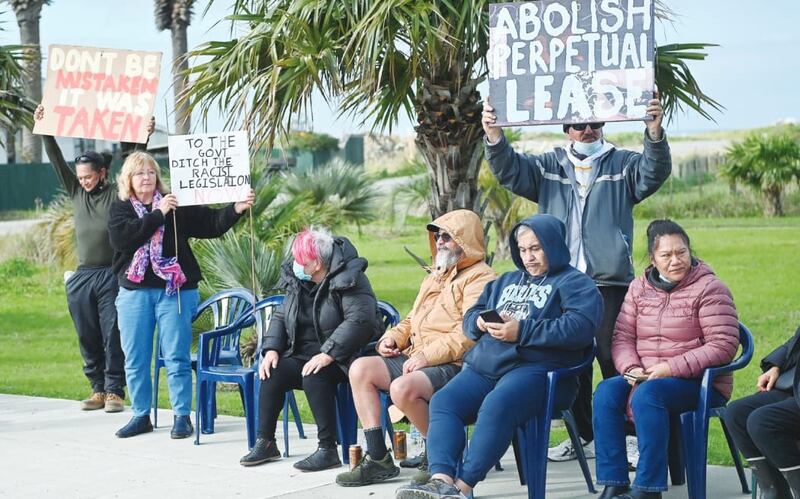Hoki Whenua Mai would see the government considering private land acquisition in Treaty settlements, remove the 2008 historic treaty claim deadline, remove controversial perpetual leases, and amend the Public Works Act to prevent a government acquiring Māori land for things like public infrastructure and roads. Photo / NZME / Mark Mitchell
The Greens say they will reform the Treaty of Waitangi settlements process, and compel the government to acquire private land as it comes up for sale, if they are part of a coalition elected in October.
The party's 'Hoki Whenua Mai' policy unveiled today would also end historic Treaty claim deadlines and perpetual leases on Māori land.
The leases, which allow tenants indefinite rights to renew rents at rates generally below market value, have been controversial, most recently causing an uproar in regions like Tokomaru Bay.
"The Aotearoa we know today has been built off Māori land, much of which was wrongly taken through breaches of Te Tiriti o Waitangi over the past 183 years," Green Party co-leader Marama Davidson said in a statement.
"Colonial land theft has caused severe disconnection and locked whānau in poverty, and this has fed ongoing inequities for Māori within the health, education, and justice systems.
"Returning land to tangata whenua is the right thing to do to begin to address these inequities."
If elected as part of the next government in October, the party would table legislation to create a commission of inquiry into land dispossession and investigate land taken through breaches of Te Tiriti o Waitangi.
"We will remove the 2008 deadline to lodge new Treaty claims and reinstate the ability for the Waitangi Tribunal to make recommendations in relation to privately owned land, as that land comes on the property market," Davidson said.
“As Aotearoa approaches the 185-year anniversary of the signing of Te Tiriti o Waitangi, and the 50-year anniversary of the Treaty of Waitangi Act, the time is now to reflect on next steps to ensure the promise of Te Tiriti is honoured and wrongs are put right."
Hoki Whenua Mai would also amend the Public Works Act to prevent whenua Māori being taken in future for government initiatives.
“Evidence tells us that when indigenous peoples have control over their land, it boosts biodiversity," Green Party Māori development spokesperson, Teanau Tuiono said.

Over Queen's Birthday Weekend last year, a group gathered at Tokomaru Bay protesting perpetual leases. The day began with a pōwhiri at Tuatini Marae, then moved to one of the land blocks next to State Highway 35. Photo / Paul Rickard / Gisborne Herald via LDR
"The Green Party’s Hoki Whenua Mai policy will not only begin to address the impacts of land loss and colonisation in Aotearoa but it will also support whānau and papatūānuku to thrive."
Treaty Negotiations Minister Andrew Little has previously dismissed private land acquisition other than in exceptional cases as off the table.
"I don't ever see a time where we would pass a law that says the Waitangi Tribunal can make orders in relation to privately owned land," he said.
"That would be a hornet's nest that no one's going to bite off."

'Now is the time to reflect on next steps to ensure the promise of Te Tiriti is honoured and wrongs are put right.' Greens co-leader Marama Davidson said on Monday. Photo / RNZ / Cole Eastham-Farrelly
Little said in 2019 returning private land was basically too cost prohibitive even for government coffers.
"The truth is there is a lot of confiscated land and to return that land it would be a massive cost to do so. I think it is just accepted that it is not practical to do so."
Davidson accepted any such moves would require more Māori MPs being elected to Parliament who backed the Greens' policy.
"With more Māori Green MPs in government we can ensure policies like Hoki Whenua Mai are upheld," she said.
"With 27% of all children in Aotearoa whakapapa Māori, the time is now to break the intergenerational harm caused by land theft,” Davidson said.
Hoki Whenua Mai
- Establish a commission of inquiry into dispossession and redress to provide evidence of the full extent of dispossession of land due to Treaty breaches.
- Repeal the claims deadline and remove the ban on historical claims to give effect to Te Tiriti o Waitangi, and continue the work of the Department of Conversation on future governance within a Te Tiriti o Waitangi framework.
- Enable recommendations for private land that was wrongfully taken from Māori as that land comes on to the property market.
- Reform the Public Works Act to prevent future taking of Māori land.
- End perpetual leases to give rent controls back to Māori land owners.
- Costings for commission of inquiry and claimant support.



